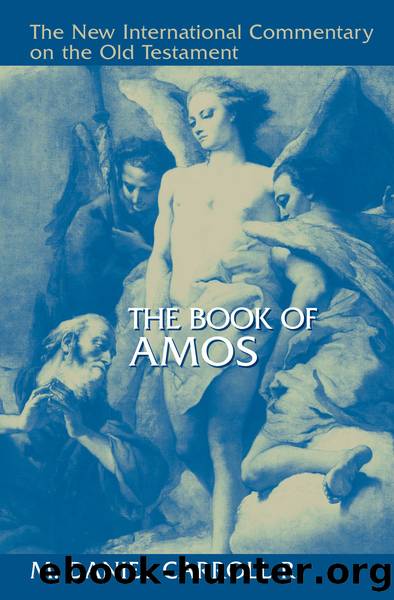The Book of Amos by M Daniel Carroll R

Author:M Daniel Carroll R [R, M Daniel Carroll]
Language: eng
Format: epub
ISBN: 9780802825384
Google: rrQwzQEACAAJ
Publisher: William B. Eerdmans Publishing Company
Published: 2020-11-15T00:12:47.534530+00:00
d. Behold the Creator (4:13)
13For behold: The one who shapes the mountainsa and creates the wind, who reveals to humanity what is his complaint,b who makes dawn into darkness, and who treads upon the high places of the earth.c Yahweh God of Hosts is his name.
a. LXX continues the first-person sense of the preceding verse and translates, â[It is] I who make the thunder strongâ (egÅ stereÅn brontÄn). See the exposition.
b. LXX has âhis anointed oneâ or âhis messiahâ (ton christon autou), for which see Dines, âThe Septuagint of Amos,â 154â56; Glenny, Finding Meaning in the Text, 236â40; Amos, 85â86. Syr. reads âhow great is his gloryâ; Tg. reads âwhat his works are.â A few scholars emend to maÊ¿Äsehû (âhis worksâ); cf. Tg. See Marti, Das Dodekapropheton, 186; Sellin, Das Zwölfprophetenbuch, 220, 225; Mays, Amos, 77. NEB translates, âwho showers abundant rain on the earth.â
c. Connecting this line to the final blessing of the righteous and the judgment on the wicked, Tg. has âto prepare light for the righteous ones like the light of the morning that gets ever stronger, and to bring darkness upon the wicked of the earth.â See Smolar and Aberbach, Studies in Targum Jonathan, 170â75; R. P. Gordon and Cathcart, The Targum of the Minor Prophets, 84.
This is the first of the hymnic passages in the book of Amos. Almost every component of the verse is disputed.327 The opening For behold (kî hinnÄh) follows dramatically on the invitation for Israel to prepare to meet its God in v. 12. These two words appear in 4:2; 6:11, 14; and 9:9 to preface an announcement of judgment.328 Here, five participles, organized into two sets of parallel strophes, introduce Yahweh in all of his transcendent power.329 The five are a counterpart to the fivefold indictment of vv. 6â11. Elsewhere in the book, participial descriptors offer negative portrayals of the characteristic behavior of those who oppress others (e.g., 2:7; 3:12; 4:1; 5:7, 18; 6:1, 3â6, 13; 8:4, 14; 9:10).330 In the doxologies, they depict the activities of the mighty Creator who comes to judge and do battle against the nation.
The first two participles speak of the power of Yahweh. He is the one who fashions the mountains and creates331 the rûaḥ. Mountains appear elsewhere in the book (3:9; 4:1; 6:1; 9:13; cf. 1:2), but scholars debate whether rûaḥ refers to the wind, the human spirit (cf. Zech 12:1),332 or even Godâs Spirit. The context of natural disasters in 4:6â11 and the mention of mountains suggest that the first option (wind) is the best. Mountains and wind serve as a merism to express Yahwehâs creation of everything from an imposing material reality to the ephemeral, from the most stable to the most fleeting. There also might be the assumption that the wind, as a powerful force in nature, marks another manifestation of Yahwehâs strength.
The meaning of the next clause, the central piece of the five-participle sequence, has also been debated. What is being revealed to humanity and to whom does his refer? The term ÅÄaḥ (âthoughtâ), a hapax legomenon, is a biform of Åîaḥ.
Download
This site does not store any files on its server. We only index and link to content provided by other sites. Please contact the content providers to delete copyright contents if any and email us, we'll remove relevant links or contents immediately.
Machine Learning at Scale with H2O by Gregory Keys | David Whiting(4313)
Never by Ken Follett(3957)
Fairy Tale by Stephen King(3399)
Reminders of Him: A Novel by Colleen Hoover(3121)
The Man Who Died Twice by Richard Osman(3081)
Will by Will Smith(2920)
It Starts With Us (It Ends with Us #2) by Colleen Hoover(2367)
Rationality by Steven Pinker(2366)
Can't Hurt Me: Master Your Mind and Defy the Odds - Clean Edition by David Goggins(2342)
Friends, Lovers, and the Big Terrible Thing by Matthew Perry(2230)
The Becoming by Nora Roberts(2204)
The Stranger in the Lifeboat by Mitch Albom(2123)
Love on the Brain by Ali Hazelwood(2078)
New Morning Mercies: A Daily Gospel Devotional by Paul David Tripp(1920)
A Short History of War by Jeremy Black(1848)
HBR's 10 Must Reads 2022 by Harvard Business Review(1845)
The Strength In Our Scars by Bianca Sparacino(1844)
A Game of Thrones (The Illustrated Edition) by George R. R. Martin(1746)
Never Finished: Unshackle Your Mind and Win the War Within by David Goggins(1714)
